Business


8 min

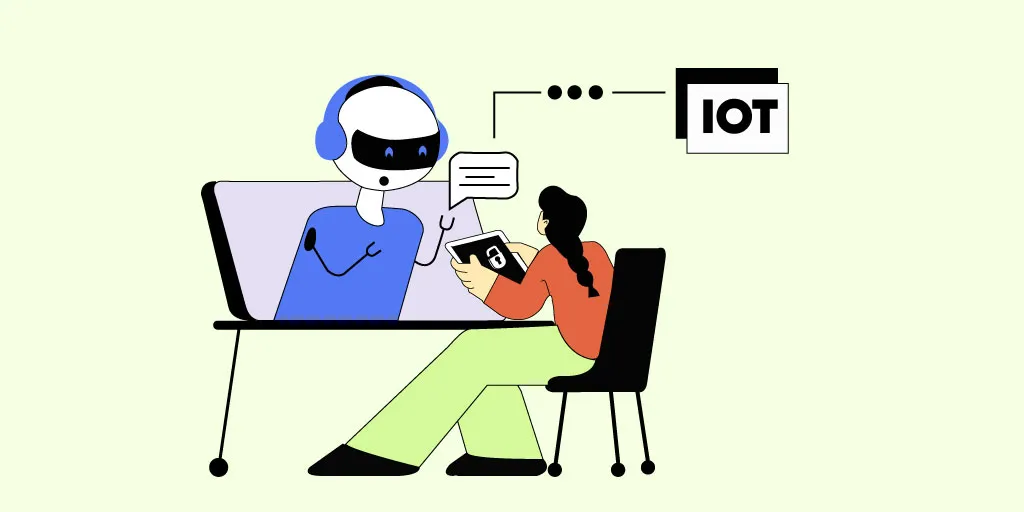
Explore the boundless business opportunities emerging at the intersection of Artificial Intelligence (AI) and the Internet of Things (IoT). Discover how this formidable combination is reshaping the digital landscape and creating unprecedented avenues for innovation. Get ready to navigate the industry's future with the ultimate power duo AI & IoT!

By Dhruv Joshi
21 Nov, 2023
In this digital earth, where new tech launches daily, businesses constantly seek innovative ways to gain a competitive edge. AI and IoT in business are two transformative technologies that have been making waves. So, Unlocking Business Opportunities with AI and IoT is a good idea! AI and IoT are also revolutionizing industries. So, by leveraging the potential of AI and IoT, companies can enhance their operations, improve customer experiences, and drive growth.
In this blog, we will explore the intersection of AI and IoT, discuss their benefits to businesses, and provide insights into how organizations can unlock opportunities by Leveraging AI and IoT for business growth.
Top Happenings in AI and IoT in Business:-
As per Statista
Amazon, Meta, and Tesla are the top companies to implement AI and IoT, and they have increased their ROI.
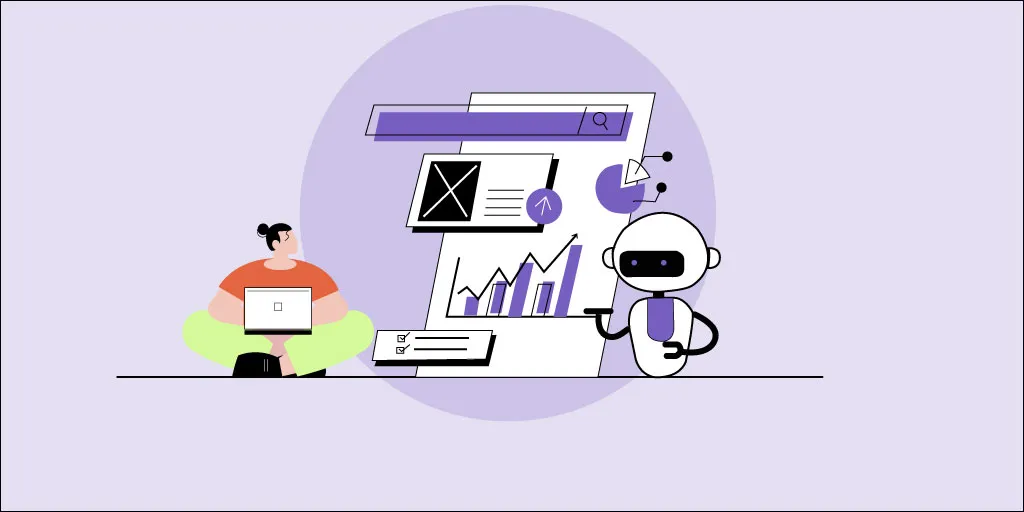
Before getting into their combined potential, let's first create a clear understanding of AI and IoT individually.
Artificial intelligence is the reproduction of human intelligence, or it acts like a human in a machine that can learn, reason, and perform tasks autonomously. AI comprises various technologies like Natural Language Processing (NLP), Machine Learning (ML), computer vision, and robotics. These capabilities enable AI systems to process vast amounts of data, recognize patterns, make predictions, and take actions based on insights. So, AI in business can bring big benefits.
The Internet of Things (IoT) is the network/junction/group of interconnected devices embedded with sensors, software, and connectivity capabilities that play a crucial role in business. These devices can collect and exchange data, letting them communicate with each other and the physical world. IoT applications span various domains, including smart homes, industrial automation, healthcare, transportation, and agriculture, showcasing the diverse and impactful integration of IoT in business operations.
AI and IoT can work together in a variety of ways. For example, AI can analyze data collected by IoT devices to identify patterns and trends. This information can improve decision-making, optimize operations, and personalize customer experiences.
Learn about: How AI & ML Can Transform The Mobile App Industry?
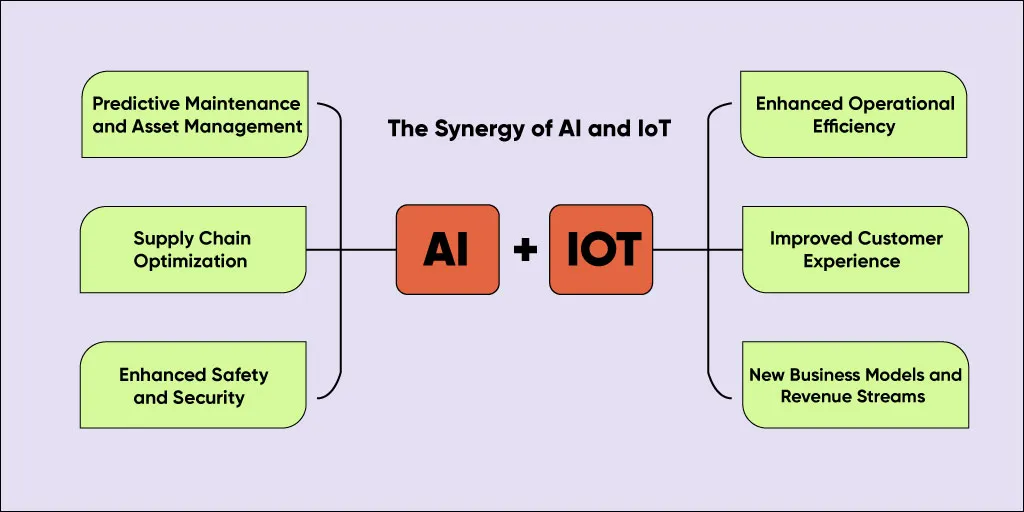 When AI and IoT converge, they create a powerful synergy that amplifies their capabilities. IoT devices produce massive amounts of data, and AI algorithms can process and extract valuable insights.
When AI and IoT converge, they create a powerful synergy that amplifies their capabilities. IoT devices produce massive amounts of data, and AI algorithms can process and extract valuable insights.
Conversely, AI systems can provide the intelligence and decision-making capabilities to optimize the performance and functionality of IoT devices. Together, unlocking business opportunities with AI and IoT is beneficial, too; here's how:-
Businesses can optimize their operations, improve productivity, and reduce costs by leveraging AI and IoT. IoT devices with sensors and connectivity can monitor and collect real-time data from various sources. AI algorithms can then examine this data to identify patterns, detect anomalies, and make predictive recommendations.
For instance, in manufacturing, IoT sensors can monitor equipment performance, while AI algorithms can predict maintenance needs, preventing costly breakdowns and reducing downtime.
AI and IoT enable businesses to deliver personalized and seamless customer experiences. By collecting data from IoT devices and other sources, AI algorithms can gain insights into customer behavior, preferences, and needs. That data can be utilized to tailor products, services, and recommendations to individual customers, enhancing satisfaction and loyalty.
For example, smart home devices can learn user preferences and adjust settings automatically, creating a personalized and comfortable living environment.
Are you also unlocking business opportunities with AI and IoT and want to provide a better customer experience? Not just it, but retain them too! You're just a click away from an utterly profitable transformation! Reach us at Quokka Labs, the best AI and IoT app development service provider.
Combining AI and IoT opens avenues for new business models and revenue streams. For example, companies can offer AI-powered analytics services that leverage IoT data to provide valuable insights to customers. Additionally, AI and IoT can enable the development of intelligent products and services that connect with the broader ecosystem. This connectivity allows businesses to gather data, provide remote support, and offer value-added services.
For example, IoT-enabled vehicles can provide real-time diagnostics and performance optimization, creating opportunities for subscription-based services.
AI and IoT can transform maintenance and asset management practices. By equipping assets with IoT sensors, businesses can monitor the condition and performance of their equipment in real-time. AI algorithms can analyze the data generated by these sensors to predict maintenance needs, optimize asset utilization, and prevent costly failures. This proactive approach minimizes downtime, reduces maintenance costs, and extends the lifespan of assets.
For example, wind turbines equipped with IoT sensors can collect performance, temperature, and vibration data in the energy sector. AI algorithms can analyze this data to detect early signs of equipment failure and schedule maintenance before any major issues occur.
Unlocking business opportunities with artificial intelligence, machine learning services, and IoT is how to grow your business! Contact Quokka Labs, the best AI and IoT app development service provider.
AI and IoT can revolutionize supply chain management by providing real-time visibility, improved efficiency, and enhanced decision-making capabilities. IoT devices can track the movement of goods, monitor inventory levels, and collect data on environmental conditions during transportation. AI algorithms can analyze this data to optimize routes, predict demand, and identify potential bottlenecks or delays. It enables businesses to streamline their supply chain operations, reduce costs, and ensure timely delivery of goods.
For instance, AI-powered demand forecasting models can analyze historical data from IoT devices to accurately predict customer demand and optimize inventory levels accordingly. Unlocking business opportunities with AI and IoT in supply chain optimization is the next big thing! Contact Quokka Labs, the best AI and IoT app development service provider.
AI and IoT can enhance safety and security measures in various industries. IoT sensors can monitor workplace conditions, detect hazards, and identify potential risks. AI algorithms can analyze this data in real-time, providing early warnings and alerts to prevent accidents or mitigate risks. In security, AI-powered video surveillance systems can analyze video feeds from IoT cameras, enabling real-time threat detection, facial recognition, and anomaly detection. That ensures a safer environment for employees, customers, and assets.
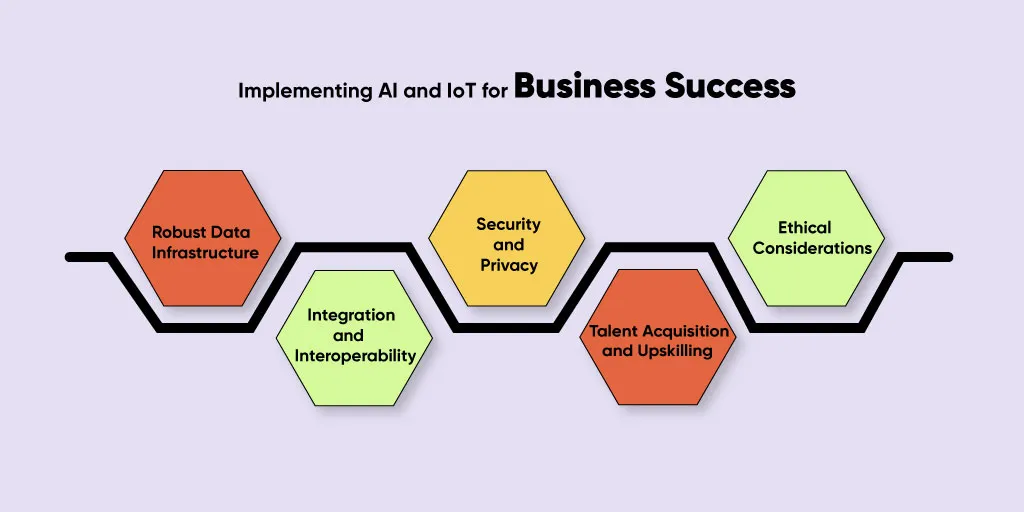 To reveal the full potential of AI and IoT, businesses must consider several key factors when implementing these technologies:
To reveal the full potential of AI and IoT, businesses must consider several key factors when implementing these technologies:
AI and IoT rely heavily on data, and businesses need to ensure they have a robust data infrastructure in place. It includes collecting, storing, securing data, and implementing proper data governance practices. Investing in scalable cloud-based storage solutions and implementing data management strategies will enable businesses to effectively handle the massive influx of data generated by IoT devices.
To fully leverage AI and IoT, businesses should focus on integrating different systems and devices seamlessly. Ensuring interoperability between IoT devices, platforms, and AI systems allows efficient data exchange and analysis. Standardized protocols and APIs enable this interoperability and simplify the integration process.
Security and privacy become paramount concerns with the increasing connectivity of IoT devices and the sensitive nature of data being collected. Firms must implement strong security measures to protect data from unauthorized access, breaches, and cyber threats. Encryption, authentication mechanisms, and regular security audits are essential to a comprehensive security strategy.
Also, complying with privacy regulations and obtaining user consent for data collection and usage is crucial to maintaining customer trust.
Implementing AI and IoT requires skilled professionals who understand these technologies and can drive organizational innovation. Businesses should invest in talent acquisition and upskilling initiatives to build a competent team capable of deploying, managing, and optimizing AI and IoT solutions. Collaborating with educational institutions, conducting training programs, and fostering a culture of continuous learning will ensure the availability of the right expertise within the organization.
As AI and IoT become increasingly integrated into business operations, ethical considerations must be considered. Organizations should prioritize transparency, fairness, and accountability in using AI algorithms and handling IoT data. Implementing ethical frameworks, establishing guidelines for responsible AI and IoT usage, and regularly evaluating the impact of these technologies on society will help businesses build trust with their customers and stakeholders.
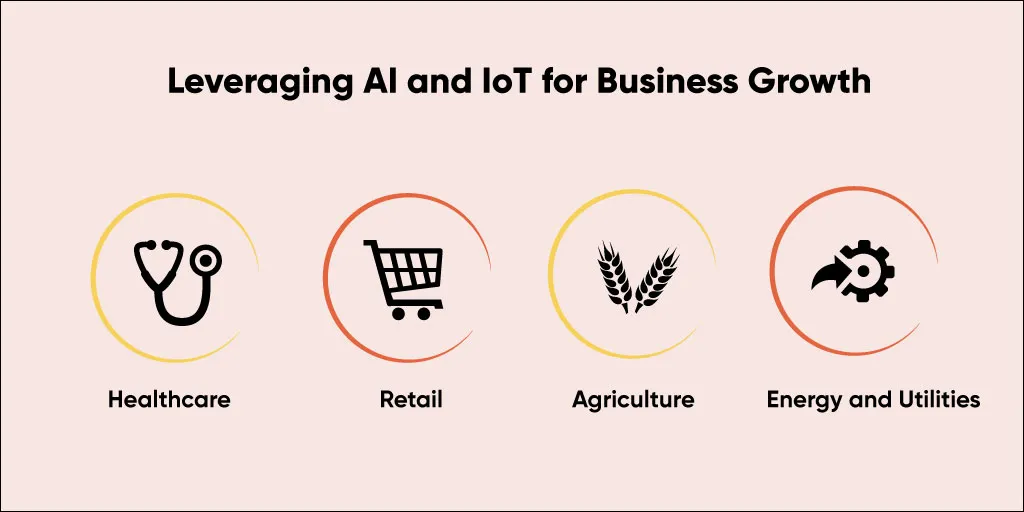
Many industries have already unlocked business opportunities with AI and IoT. You can grow your Business, too. Here are a few real-world examples:
AI-powered IoT devices transform patient care in the healthcare sector. Wearable devices with sensors can monitor vital signs and collect data in real-time. AI algorithms analyze this data to detect anomalies, provide early warnings for potential health issues, and offer personalized treatment recommendations.
Remote patient monitoring and telemedicine solutions powered by AI and IoT enable patients to receive quality care from the comfort of their homes. Also, AI-powered chatbots and virtual assistants can give patients instant access to healthcare information and support.
Retailers are leveraging AI and IoT to enhance the shopping experience. Smart shelves with IoT sensors can track inventory levels, enabling real-time inventory management and reducing stockouts. AI-powered chatbots and virtual assistants provide personalized recommendations and assistance to customers.
In-store beacons use IoT technology to send location-based offers and promotions to shoppers' smartphones. AI algorithms analyze customer data to understand preferences and buying patterns, enabling retailers to offer personalized marketing campaigns and targeted advertisements.
Learn about Great Ways CRM Can Benefit Your E-Retail Business
AI and IoT are revolutionizing agriculture by enabling smart farming practices. Field IoT sensors collect soil moisture, temperature, and nutrient levels data. AI algorithms analyze this data to give farmers insights into optimal irrigation schedules, fertilization requirements, and pest management strategies. This data-driven approach improves crop yields, minimizes resource wastage, and reduces environmental impact.
Also, IoT devices connected to automated machinery and drones allow for precision farming, ensuring accurate seeding, fertilizing, and harvesting.
The energy and utilities sector can benefit significantly from integrating AI and IoT. Smart grid systems with IoT sensors and AI algorithms optimize energy distribution and consumption. Real-time monitoring of energy usage helps identify areas of inefficiency and enables demand-response strategies.
Smart meters enable accurate billing and help consumers track and manage their energy consumption. In the renewable energy sector, AI and IoT enable predictive maintenance of wind turbines and solar panels, maximizing energy production and reducing maintenance costs.
Learn about: How AR Improve your Business in Retail & E-Commerce?
In the digital age, combining AI and IoT holds immense potential for businesses across various sectors. By harnessing the power of AI and IoT, organizations can unlock new opportunities, drive innovation, and gain a competitive advantage. However, successful implementation requires careful consideration of the factors we discussed above!
By Leveraging AI and IoT for business growth, businesses can open doors to a world of possibilities and new avenues for success in the digital era.
Are you also on the way to Unlocking business opportunities with AI and IoT? You can reach us for the best AI and IoT App development services provider!
Learn about: How 5G Impacts the Mobile App Development?
AI in business involves automating tasks, analyzing data for insights, and enhancing decision-making through machine learning, improving operational efficiency and competitiveness.
IoT in business enables seamless connectivity and data exchange among devices, optimizing processes, tracking assets, and fostering real-time monitoring, ultimately enhancing overall efficiency and productivity.
The combined role of AI and IoT in business lies in leveraging intelligent automation, data-driven insights, and interconnected devices to drive innovation, streamline operations, and create a more adaptive and responsive business environment.
What Is an API? A Developer's Guide to Application Integration in 2025
By Dhruv Joshi
5 min read
What Is a Push Notification and Why It Matters for Your App Strategy
By Dhruv Joshi
5 min read
Top React Native Development Companies to Build Scalable Apps
By Dhruv Joshi
5 min read
How Wearable Technology Is Driving Real-Time Data Experiences in Mobile Apps
By Sannidhya Sharma
5 min read

Business


5 min
What is a push notification and how does it boost app engagement? Learn the best practices, examples, and strategies for using push notifications effectively in your mobile app. Drive retention, re-engage users, and improve ROI with smart, timely alerts.


Business


5 min
Looking for the best React Native app development companies in 2025? This expert guide highlights the top 10 agencies trusted for building scalable, user-friendly, and cross-platform mobile apps. Learn how to choose the right partner, explore key services, compare pricing, and discover what makes each company stand out in today’s fast-growing mobile market.


Business


5 min
Let’s explore how augmented reality is reshaping accounting apps—from static spreadsheets to immersive, interactive experiences. This blog dives into real-world use cases, UX benefits, and how fintech teams can build smarter, user-first financial tools with AR.

Feeling lost!! Book a slot and get answers to all your industry-relevant doubts